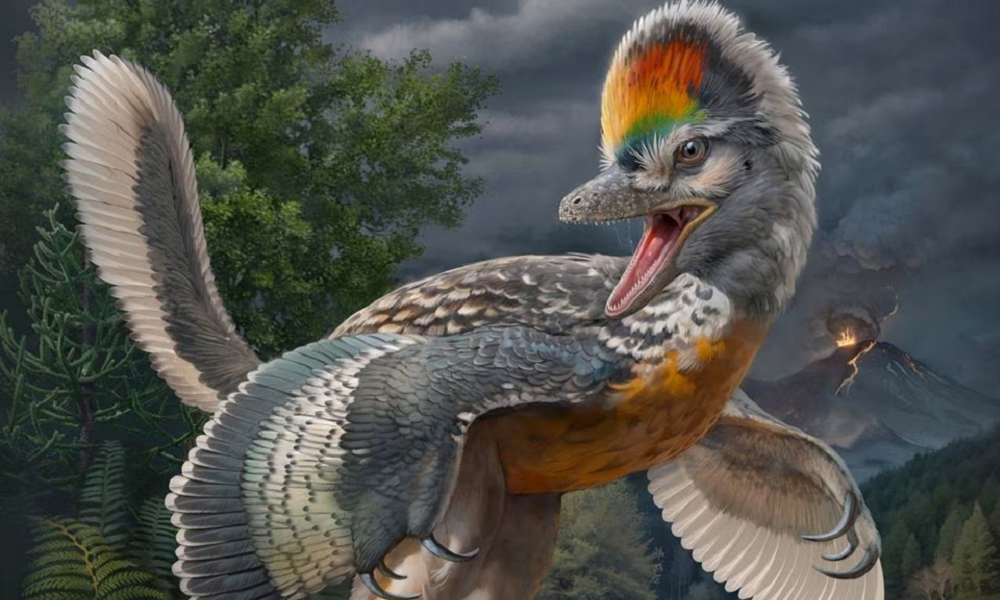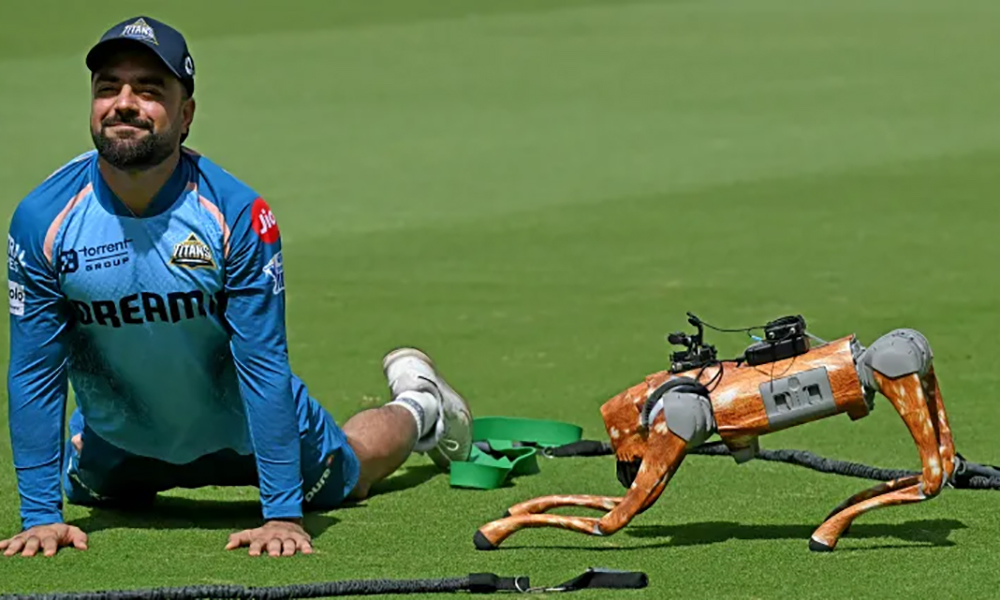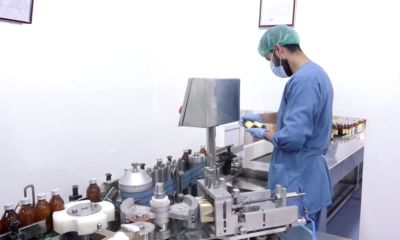Science & Technology
‘Bizarre’ long-legged bird-like dinosaur has scientists enthralled

About 148 to 150 million years ago, a strange pheasant-sized and bird-like dinosaur with elongated legs and arms built much like wings inhabited southeastern China, with a puzzling anatomy suggesting it either was a fast runner or lived a lifestyle like a modern wading bird.
Scientists said on Wednesday they have unearthed in Fujian Province the fossil of a Jurassic Period dinosaur they named Fujianvenator prodigiosus – a creature that sheds light on a critical evolutionary stage in the origin of birds, Reuters reported.
The question of whether Fujianvenator, with its curious mixture of skeletal features, should be classified as a bird depends on how one defines a bird, according to study leader Min Wang, a paleontologist at the Institute of Vertebrate Paleontology and Paleoanthropology of the Chinese Academy of Sciences.
Asked for a word to describe Fujianvenator, Wang replied, “I would say ‘bizarre.’ Fujianvenator is far from similar to any modern birds.”
A remarkable event in dinosaur evolution came when small feathered two-legged dinosaurs from a lineage known as theropods gave rise to birds late in the Jurassic, with the oldest-known bird – Archaeopteryx – dating to roughly 150 million years ago in Germany.
Fujianvenator is a member of a grouping called avialans that includes all birds and their closest non-avian dinosaur relatives, Wang said. Despite their modest beginnings, birds survived the asteroid strike 66 million years ago that doomed their non-avian dinosaur comrades.
The Fujianvenator fossil, discovered last October, is fairly complete but lacks the animal’s skull and parts of its feet, making it hard to interpret its diet and lifestyle.
Fujianvenator’s lower leg bone – the tibia – was twice as long as its thigh bone – the femur. Such dimensions are unique among theropods, a group that includes all the meat-eating dinosaurs such as Tyrannosaurus and various others. It also had a long bony tail.
“The forelimb is generally built like a bird’s wing, but with three claws on the fingers, which are absent from modern birds. So you can call it wing. It cannot be determined whether it could fly or not. Based on the skeletal features, Fujianvenator probably is at least not good at flying,” Wang said.
“The fossil itself does not preserve feathers. However, its closest relatives and nearly all the known avialan theropods have feathers, and feathers are widely distributed among dinosaurs. Therefore, it would not be a surprise if Fujianvenator had feathers,” Wang added.
Based on the anatomy of its long legs, the researchers proposed two possible lifestyles – either fast running or wading in a swampy environment much like modern cranes or herons.
“I would put my money on runner,” Wang said.
Scientists are seeking a better understanding of the origin of birds as well as non-avian dinosaurs with bird-like traits.
“To me, Fujianvenator represents another interesting piece of evidence showing the wide distribution of various bird-like dinosaurs living nearly at the same time and sharing similar habitats with their bird descendants,” said paleontologist Zhonghe Zhou of the Institute of Vertebrate Paleontology and Paleoanthropology, a co-author of the study published in the journal Nature.
The earliest chapters in the history of birds remain murky due to the paucity of fossils. After Archaeopteryx – a crow-sized bird with teeth, a long bony tail and no beak whose fossils were first found in the 19th century – there is a canyon of about 20 million years before the next birds appear in the fossil record.
“One thing is for sure. There is still a big gap between the oldest known bird and the second-oldest known birds,” Zhou said.
Science & Technology
Apple moving to make most iPhones for US in India rather than China

Apple aims to make most of its iPhones sold in the United States at factories in India by the end of 2026, and is speeding up those plans to navigate potentially higher tariffs in China, its main manufacturing base, Reuters reported.
The U.S. tech giant is holding urgent talks with contract manufacturers Foxconn and Tata to achieve that goal, the person, who declined to be named as the planning process is confidential, said on Friday.
Apple and Foxconn did not immediately respond to requests for comment, while Tata declined to comment.
Apple sells over 60 million iPhones in the U.S. annually with roughly 80% of them made in China currently.
Prime Minister Narendra Modi has in recent years promoted India as a smartphone manufacturing hub, but higher duties on importing mobile phone parts compared to many other countries means it is still expensive for companies to produce in India.
For iPhones, manufacturing costs in India are 5-8% higher than in China, with the difference rising to as much as 10% in some cases, the source said.
Apple has already stepped up production in India to beat U.S. President Donald Trump’s tariffs, shipping some 600 tons of iPhones worth $2 billion to the United States in March. The shipments from India marked a record for both its contractors Tata and Foxconn, with the latter alone accounting for smartphones worth $1.3 billion, Reuters reported last week.
In April, the U.S. administration imposed 26% duties on imports from India, much lower than the more than 100% China was facing at the time. Washington has since paused most duties for three months, except for China.
Trump’s administration has since signalled openness to de-escalating the trade war between the world’s two largest economies that has raised fears of recession.
The Financial Times first reported about Apple’s plan on Friday.
As Apple diversifies its manufacturing beyond China, it has positioned India for a critical role. Foxconn and Tata, its two main suppliers there, have three factories in all, with two more being built.
Science & Technology
China, Russia may build nuclear plant on moon to power lunar station, official says
Russia’s space agency Roscosmos said last year it planned to build a nuclear reactor on the moon’s surface with the China National Space Administration (CNSA) by 2035 to power the ILRS.

China is considering building a nuclear plant on the moon to power the International Lunar Research Station (ILRS) it is planning with Russia, a presentation by a senior official showed on Wednesday.
China aims to become a major space power and land astronauts on the moon by 2030, and its planned Chang’e-8 mission for 2028 would lay the groundwork for constructing a permanent, manned lunar base.
In a presentation in Shanghai, the 2028 mission’s Chief Engineer Pei Zhaoyu showed that the lunar base’s energy supply could also depend on large-scale solar arrays, and pipelines and cables for heating and electricity built on the moon’s surface.
Russia’s space agency Roscosmos said last year it planned to build a nuclear reactor on the moon’s surface with the China National Space Administration (CNSA) by 2035 to power the ILRS.
The inclusion of the nuclear power unit in a Chinese space official’s presentation at a conference for officials from the 17 countries and international organisations that make up the ILRS suggests Beijing supports the idea, although it has never formally announced it.
“An important question for the ILRS is power supply, and in this Russia has a natural advantage, when it comes to nuclear power plants, especially sending them into space, it leads the world, it is ahead of the United States,” Wu Weiren, chief designer of China’s lunar exploration program, told Reuters on the sidelines of the conference.
After little progress on talks over a space-based reactor in the past, “I hope this time both countries can send a nuclear reactor to the moon,” Wu said.
China’s timeline to build an outpost on the moon’s south pole coincides with NASA’s more ambitious and advanced Artemis programme, which aims to put U.S. astronauts back on the lunar surface in December 2025.
Wu said last year that a “basic model” of the ILRS, with the Moon’s south pole as its core, would be built by 2035.
In the future, China will create the “555 Project,” inviting 50 countries, 500 international scientific research institutions, and 5,000 overseas researchers to join the ILRS.
Researchers from Roscosmos also presented at the conference in Shanghai, sharing details about plans to look for mineral and water resources, including possibly using lunar material as fuel.
The ILRS preceded Russia’s invasion of Ukraine in 2022 but incentives for cooperation between Roscosmos and CNSA have increased since the outbreak of the war, according to Chinese analysts.
With China’s rapid technological advances and lunar achievements, and as Western sanctions prevent Roscosmos from many imports of space technology and equipment, China can now “alleviate the pressure” on Russia and help it “achieve new breakthroughs in satellite launches, lunar exploration, and space stations,” Liu Ying, a researcher at the Chinese foreign ministry’s diplomatic academy, wrote in a journal article last year.
International Sports
IPL 2025: Robo-Dog ‘Champak’ explained
Covered in a brown fur-like print and fitted with a camera in place of a face, the robot is designed to offer dynamic, on-ground visuals from a dog’s eye view

Organizers of this year’s Indian Premier League (IPL) are blazing a trail when it comes to embracing cutting edge technology and over the past week have deployed an AI-powered robotic dog that is fast growing in popularity among both players and fans.
The mechanical camera-carrying canine, named Champak, is the latest addition to the league’s broadcast team and was introduced to the public before the Delhi Capitals and Mumbai Indians match at the Arun Jaitley Stadium on April 13.
Former New Zealand cricketer and commentator Danny Morrison formally introduced his new broadcast companion before demonstrating the IPL robot dog’s ability to run, jump, respond to various voice commands and even draw a heart shape with its front limbs.
The video clip, put out by the IPL’s social media handles, also shows Mumbai Indians’ players Hardik Pandya, Reece Topley and Delhi Capitals captain Axar Patel interacting with the robot dog and having a blast.
The IPL also called on fans to help name the robot dog, which has been a regular part of the broadcast team in subsequent matches. Fan votes eventually saw the robotic canine named Champak.
During the Lucknow Super Giants vs Chennai Super Kings clash in Lucknow, MS Dhoni couldn’t resist a little fun with the robo-dog – playfully lifting it up and putting it down sideways, much to the crowd’s delight.
Known for his love of dogs, often seen in heart-warming moments with his own pets on social media, MS Dhoni later scooped up the mechanical pup and carried it off, probably for some extra playtime.
Covered in a brown fur-like print and fitted with a camera in place of a face, the robot is designed to offer dynamic, on-ground visuals from a dog’s eye view, bringing fans closer to the action in new and immersive ways.
Comparable to a GoPro-like action cameras, the robot dog enables unique broadcast angles along the sidelines and pitch perimeter.
The IPL robot dog draws clear inspiration from the quadrupeds designed by United States-based robotics company Boston Dynamics.
Similar quadrupeds have been deployed from military logistics to hazardous site inspections. The IPL’s version appears to be a small and playful adaptation.
Have you seen Champak yet?
For cricket fans across the country, tune in today, Monday April 22, to watch Lucknow Super Giants take on Delhi Capitals. The match starts at 5pm Kabul time.
Ariana Television will broadcast the match live and exclusively across Afghanistan and hopefully Champak will once again be out of the field for fans to see.
-

 Sport4 days ago
Sport4 days agoSri Lanka A defeats Afghanistan A by 4 wickets in Abu Dhabi
-

 Business5 days ago
Business5 days agoAfghanistan’s growth prospects remain uncertain amid global uncertainty: World Bank report
-

 World5 days ago
World5 days agoUkraine ready to hold talks with Russia once ceasefire in place, Zelenskiy says
-

 Latest News4 days ago
Latest News4 days agoAWCC activates new site in Nangarhar’s Kuz Kunar district
-

 Latest News4 days ago
Latest News4 days agoTarig Ali Bakheet and Japan’s Deputy Foreign Minister discuss Afghanistan’s situation
-

 Climate Change5 days ago
Climate Change5 days agoPowerful earthquake of 6.2 magnitude shakes Istanbul
-

 Business4 days ago
Business4 days agoPakistan’s deputy PM discusses Trans-Afghan Railway Line project with Uzbek FM
-

 Latest News4 days ago
Latest News4 days agoSpecial meeting will be held to launch Afghanistan–Russia joint commission, says Kabulov

























